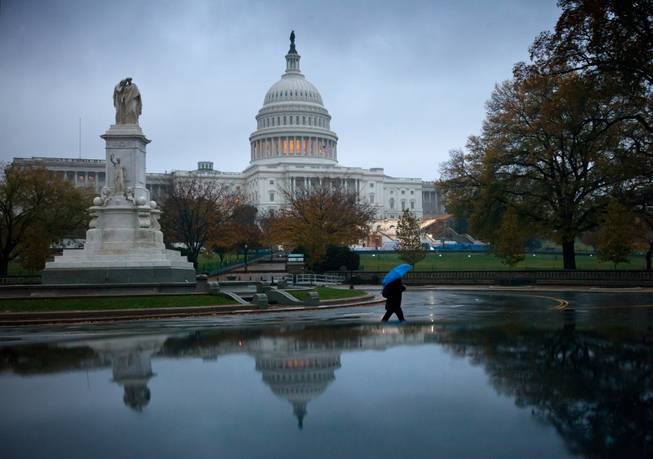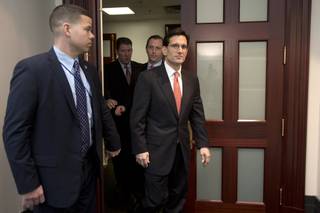
J. Scott Applewhite / AP file
FILE - In this Nov. 13, 2012 file photo, a man walks in front of the Capitol in Washington. The debate in Washington over taxes and spending is likely to continue damaging the fragile economy well into 2013. The political standoff has already taken an economic toll, creating uncertainty about the future and discouraging consumers from spending and businesses from hiring and investing.
Tuesday, Jan. 1, 2013 | 5:24 p.m.
Related stories
- Political brinksmanship still threatens US economy
- Fiscal cliff conclusion may not come before the new Congress
- House expected to send fiscal cliff deal back to the Senate
- Why lawmakers’ failure to beat fiscal cliff deadline might benefit them
- Grand bargains give way to legislative quick fixes
- White House, Senate Republicans reach ‘fiscal cliff’ deal
- Biden and Reid take good cop-bad cop approach to negotiating with Republicans
- Payroll tax hike to take $1,000 bite out of average worker’s annual pay
- Country to head over fiscal cliff as lawmakers continue negotiating
- More Sun political news
After a few tense hours, House Republicans will not try to amend the Senate-passed "fiscal cliff" deal after all, but will put the Senate bill on the floor for a clean up-or-down vote.
Rep. Alcee Hastings, a Democrat on the Rules committee, confirmed that the GOP had dropped its quest to amend the Senate-passed deal with more than $300 billion of spending cuts to address the frustrations of members of the GOP.
The House is scheduled to vote on the fiscal cliff deal after 9 p.m. EST, meaning the fiscal cliff will be averted before stock markets re-open after the New Year’s holiday Wednesday morning.
The Senate passed the deal on an 89 to 8 vote around 2 a.m. Tuesday, with Nevada Sens. Harry Reid and Dean Heller both voting in favor of it.
The deal restores the Bush-era tax cuts for incomes up to $400,000, or $450,00 for couples filing joint tax returns. Above that threshold, tax rates will be left to rise from 35 percent to 39.6 percent, starting with 2013 tax returns.
The deal also extends unemployment benefits, sales tax deductions, mortgage debt relief deductions and energy tax deduction for a year, and makes permanent a correction to the alternative minimum tax and the $5 million exemption on estate taxes, which is also pegged to inflation.
The nation technically went off the fiscal cliff just after midnight Tuesday morning, but the effect of the tax hikes and across-the-board budget cuts that were triggered when the calendar changed to 2013 were not expected to be felt for several weeks.
The deal delays the onset of the across-the-board budget cuts, known as sequestration, for two months.
House lawmakers, including Nevada Rep. Joe Heck, had predicted over the last few days that if they struck a deal before the markets opened on Wednesday, Congress should be able to avoid any adverse economic effects from concerns about going over the cliff as well.
Though not all members of the Nevada delegation have declared how they will vote on the final deal, Rep. Mark Amodei predicted earlier Tuesday evening that he will be the only member of the delegation to vote no.


Join the Discussion:
Check this out for a full explanation of our conversion to the LiveFyre commenting system and instructions on how to sign up for an account.
Full comments policy